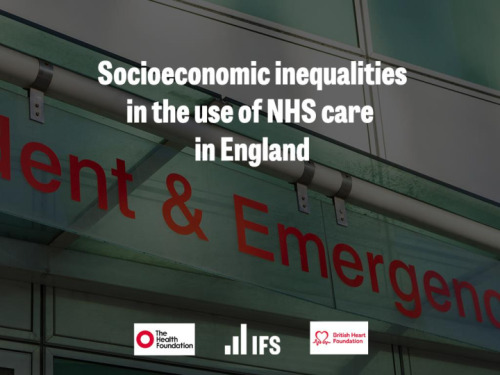Downloads

Download Ben Zaranko's slides
PDF | 428.47 KB
Providing equal access to healthcare to all solely on the basis of need was a founding principle of the NHS. Despite this, large differences persist in the amount of care used by people living in different areas and with different backgrounds. At this event we explored the findings of new IFS work outlining what has happened to educational inequalities in health care in England since 2002-03.
You can watch the full video below, or download the slides here:
- Ben Zaranko (IFS): Download slides
- Anita Charlesworth (Health Foundation): Download slides
- Martin McKee (London School of Hygiene & Tropical Medicine): Download slides
Authors

Anita Charlesworth

Senior Research Economist
Ben is a Senior Research Economist and an editor of the IFS Green Budget. His work focuses on the health and social care system and UK fiscal policy.

Martin McKee
Presentation details
- Publisher
- IFS
Suggested citation
A, Charlesworth and M, McKee and B, Zaranko. (2020). 'Socioeconomic inequalities in the use of NHS care in England' [Presentation]. London: IFS. Available at: https://ifs.org.uk/publications/socioeconomic-inequalities-use-nhs-care-england (accessed: 30 June 2024).
Related documents
Download Anita Charlesworth's slides
PDF | 485.53 KB
Download Martin McKee's slides
PDF | 2.18 MB
More from IFS
Understand this issue

If you can’t see it, you can’t be it: role models influence female junior doctors’ choice of medical specialty
24 April 2024

The NHS waiting list: when will it come down?
29 February 2024

Liberal Democrat manifesto: a reaction
10 June 2024
Policy analysis

How do the last five years measure up on levelling up?
19 June 2024

A response to the Conservatives’ proposals to reduce growth in the health-related benefits bill
8 June 2024

IFS response to Labour Party announcement on NHS waiting lists
28 May 2024
Academic research

The role of hospital networks in individual mortality
13 May 2024

Forced displacement, mental health, and child development: Evidence from Rohingya refugees
10 May 2024

A senior doctor like me: Gender match and occupational choice
24 April 2024